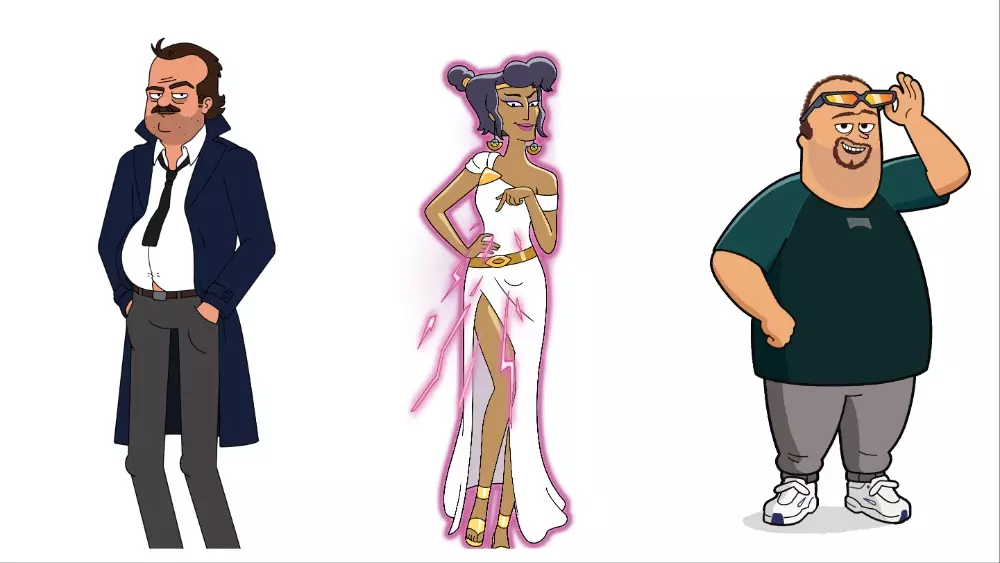In an assertive move to bolster its animated programming, Fox has renewed three animated series—Grimsburg, Krapopolis, and Universal Basic Guys—alongside securing four additional seasons for its longstanding staples such as The Simpsons, Family Guy, and Bob’s Burgers. This vigorous approach is not merely a maintenance of existing popularity but a calculated strategy designed to fortify the network’s foothold in the competitive landscape of animated content. By combining new narratives with proven favorites, Fox is crafting an ambitious animated universe that pushes the boundaries of storytelling.
The Allure of ‘Grimsburg’
Among the newcomers, Grimsburg is particularly intriguing. Featuring the talented Jon Hamm as the protagonist Marvin Flute, the show blends detective fiction with dark humor. Set in a town where secrets abound, Marvin’s struggle for self-discovery takes center stage as he grapples with his own failings while chasing down a cannibal clown. The duality of the investigative plot and personal redemption resonates deeply within a culture that values both mystery and introspection. The vibrant supporting cast, including comedic talents like Erinn Hayes and Alan Tudyk, promises to enhance the rich tapestry of Grimsburg, making it a show worth following.
Showcasing not just clever writing but strong character development, the series invites viewers to delve into the complexities of human nature—mimicking the very issues many face today. When a detective can’t decode his own life while unraveling a mystery, it mirrors the existential puzzles viewers confront in their daily existence. As a network, Fox is taking a significant risk by emphasizing the character-driven approach within an animated series, setting Grimsburg apart from its more traditional animated counterparts.
The Stronghold of Krapopolis
Krapopolis, the creation of Dan Harmon, has astoundingly been renewed for its fifth season before even completing the first half of its narrative run. Set in a fantastical version of ancient Greece, it offers a uniquely comedic take on familial and societal dynamics through its cast of gods, mythical creatures, and humans. The show thrives on absurdity while tackling the timeless theme of dysfunctional family relationships.
What makes Krapopolis particularly noteworthy is its meta-commentary on modern society; it juxtaposes the ancient milieu with contemporary issues, ultimately creating a relatable yet bizarre experience. The character of Deliria, a goddess driven by self-interest and personal gain, acts as a mirror to modern behaviors, representing an unvarnished view of ambition and community, however chaotic it may appear. With modes of humor that resonate with viewers and satirical nods to historical constructs, Krapopolis has become a flagship for innovation in animated storytelling.
Universal Basic Guys and the New Narrative Landscape
Equally compelling is Universal Basic Guys, which tackles the contemporary challenge of job displacement due to automation. The show, featuring brothers Mark and Hank Hoagies, finds humor in the dire circumstances stemming from economic shifts, catering to an audience currently navigating similar complexities in real life. By adopting a comedic lens to shed light on an increasingly automated world, it underscores the need for personal growth and meaning beyond traditional employment.
The narrative premise raises essential questions about purpose and value in an era where work no longer defines one’s identity. Utilizing the comedic dynamic between the brothers, the series reflects both the absurdity and reality of a generation facing potentially diminished roles within society. By leveraging humor to explore serious themes, Universal Basic Guys resonates with a diverse viewership seeking engaging yet thoughtful commentary on their own lives and struggles.
Future of Animation: The Uncertain Fate of ‘The Great North’
Yet amidst these renewals, The Great North stands in limbo. With its mixed reception, the series reflects the unpredictably nuanced nature of animated programming in today’s media landscape. Despite being populated with comedic heavyweights like Nick Offerman and Jenny Slate, the network’s indecision hints at a deeper evaluation of what constitutes successful storytelling. Fox’s Eric Schrier has indicated that the network holds a degree of admiration for the series, suggesting that judgment is not merely about ratings but also about the potential for growth within the established animated framework.
As Fox forges ahead in the animation arena, its choices appear both calculated and exploratory, aiming to blend popular styles with pioneering narratives. This reimagining of its animated portfolio not only reinvigorates existing franchises but opens doors for new explorations in storytelling that reflect contemporary challenges and absurdities, thereby solidifying Fox’s role as a leader in animated programming.


Leave a Reply